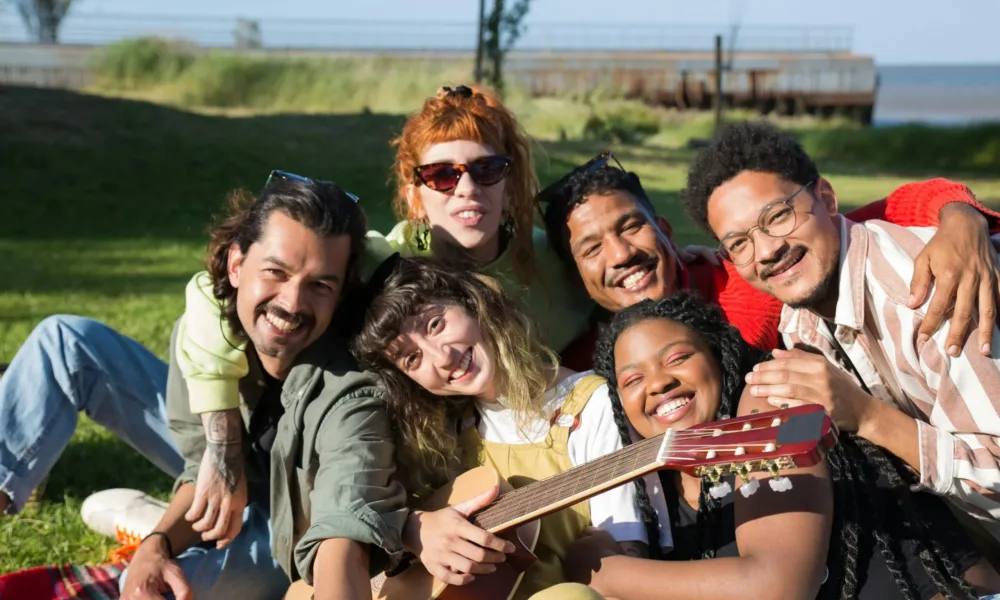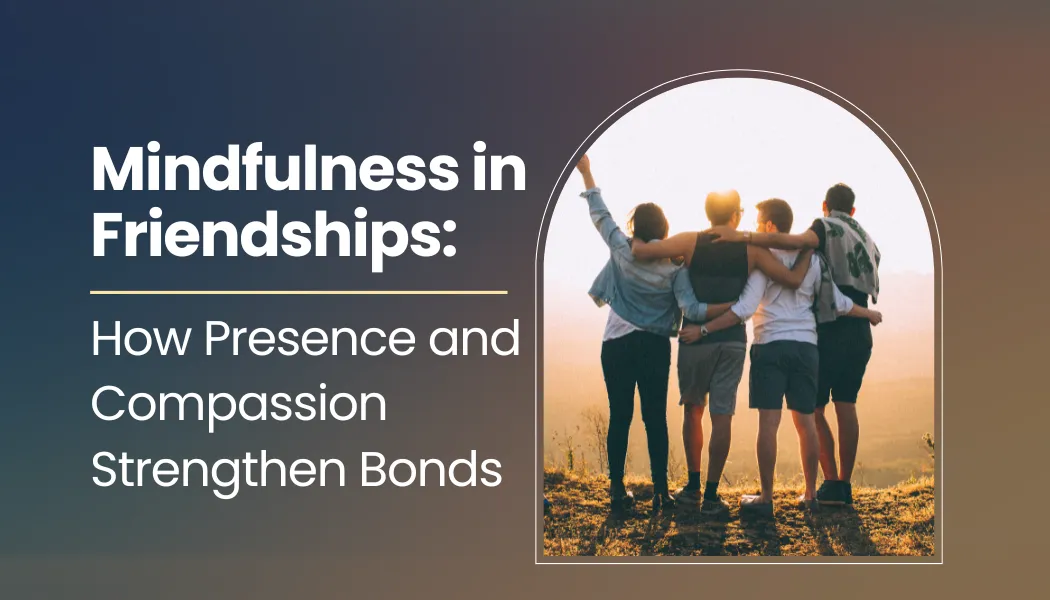Mindfulness in Friendships: How Presence and Compassion Strengthen Bonds
Friendships are the heartbeat of human connection. They provide comfort, laughter, encouragement, and the feeling of being truly seen. Yet in today’s world, many friendships are tested by busyness, digital distractions, and unspoken misunderstandings.
Friendships are the heartbeat of human connection. They provide comfort, laughter, encouragement, and the feeling of being truly seen. Yet in today’s world, many friendships are tested by busyness, digital distractions, and unspoken misunderstandings. Building and maintaining meaningful bonds takes more than casual conversations—it requires presence, empathy, and emotional depth.
This is where mindfulness comes in. Often associated with meditation or stress relief, mindfulness is much more than a wellness practice. It’s a way of approaching relationships with full attention and openness, creating space for genuine connection. When applied to friendships, mindfulness strengthens trust, deepens understanding, and fosters resilience through life’s ups and downs.
In this article, we’ll explore how mindfulness enhances friendships, the science behind mindful relationships, practical strategies to weave mindfulness into your social life, and real-life examples of how presence transforms connections.
Table of contents
- Understanding Mindfulness in Friendships
- Why Friendships Need Mindfulness
- The Science of Mindfulness and Social Connection
- Practical Ways Mindfulness Builds Stronger Friendships
- Mindfulness and Conflict in Friendships
- Everyday Mindful Practices for Stronger Friendships
- Real-Life Scenarios
- Long-Term Benefits of Mindful Friendships
- Conclusion
Understanding Mindfulness in Friendships
Mindfulness is the practice of being fully aware of the present moment, with curiosity and without judgment. In friendships, this translates into:
- Active presence: Truly listening when a friend speaks instead of rehearsing your reply.
- Acceptance: Allowing your friend to be who they are without trying to fix or control them.
- Compassion: Responding with kindness, even when disagreements or mistakes arise.
- Non-reactivity: Pausing before reacting to a message or behavior that triggers you.
When friendships are filtered through mindfulness, the relationship shifts from surface-level interactions to a bond based on authenticity and emotional safety.
Why Friendships Need Mindfulness
1. The Challenge of Distraction
Modern life is full of interruptions—social media notifications, work stress, and endless to-do lists. Friends may be physically present but mentally absent, weakening the quality of interactions. Mindfulness reorients attention to the “here and now,” making each shared moment more meaningful.
2. Miscommunication and Assumptions
Many friendships break down due to misinterpretations or unspoken resentment. Mindfulness reduces this by encouraging careful listening and thoughtful communication rather than automatic assumptions.
3. Emotional Overload
Stress, anxiety, and emotional reactivity can spill into friendships, leading to conflicts. A mindful approach helps regulate emotions so friends can respond rather than react impulsively.
By practicing mindfulness, we bring clarity and care into relationships, making friendships more resilient and fulfilling.
The Science of Mindfulness and Social Connection
Researchers have studied how mindfulness influences human connection, with fascinating results:
- Improved Empathy: Studies show that mindfulness enhances empathy by increasing activity in the brain regions linked to compassion and emotional understanding.
- Better Conflict Resolution: Mindfulness reduces aggressive reactions and improves communication in conflicts, helping friends find common ground.
- Stronger Emotional Bonds: Mindfulness increases oxytocin (the “bonding hormone”), deepening the sense of trust and closeness.
- Reduced Loneliness: Mindful individuals often report feeling less isolated because they connect more authentically with others.
These findings confirm what many experience in practice: mindfulness isn’t just about personal calm—it’s about stronger, healthier connections.
Practical Ways Mindfulness Builds Stronger Friendships
1. Mindful Listening
Most people listen to reply, not to understand. Mindful listening means giving your full attention to your friend—eye contact, silence, and openness—without rushing to fix or advise.
Example: Instead of interrupting when your friend shares about a tough day, you pause, breathe, and simply say, “I hear you. That sounds really hard.” This small shift makes your friend feel valued and understood.
2. Being Fully Present
When you’re with a friend, put away your phone, avoid multitasking, and truly focus on the shared moment. Presence is one of the greatest gifts you can offer.
Practice: Next time you have coffee with a friend, challenge yourself to keep your phone face-down and untouched. Notice how the quality of conversation deepens.
3. Practicing Non-Judgment
Instead of labeling your friend’s behavior as “good” or “bad,” mindfulness invites curiosity: “Why might they be acting this way?” This fosters acceptance and patience, even in disagreements.
4. Responding with Compassion
When a friend makes a mistake—forgetting a plan, saying something hurtful, or canceling last minute—mindfulness helps you pause before reacting. You can choose compassion over blame.
Mindful Reflection: Ask yourself, “Am I reacting to my own frustration, or am I considering their perspective too?”
5. Sharing Gratitude Mindfully
Regularly expressing appreciation strengthens bonds. A mindful thank-you goes beyond politeness—it acknowledges effort and presence.
Example: Instead of a quick “Thanks,” you might say, “I really appreciate you checking in on me today. It meant a lot.”
6. Mindful Self-Awareness
Mindfulness in friendships isn’t only about how you treat your friend—it’s also about knowing yourself. By recognizing your triggers, insecurities, or emotional patterns, you can prevent projecting them onto your friends.
Mindfulness and Conflict in Friendships
Conflict is inevitable in close relationships. But mindfulness changes how we approach disagreements:
- Pause before reacting: A breath creates space between stimulus and response.
- Acknowledge emotions: Mindfulness helps you notice, “I’m angry,” without letting anger control your words.
- Seek understanding, not victory: Instead of proving your point, you focus on understanding the other person’s perspective.
- Repair with presence: After conflict, mindful reflection helps you apologize sincerely and rebuild trust.
Conflict, when navigated mindfully, can actually strengthen friendships by deepening mutual respect.
Everyday Mindful Practices for Stronger Friendships
Here are small, practical ways to integrate mindfulness into your social life:
- Friendship Check-In Rituals
Spend two minutes at the start of a conversation just listening without interruption. - Mindful Messages
Before replying to a text, pause. Ask: Is my response kind, necessary, and true? - Shared Mindfulness Activities
Try a short meditation, yoga session, or mindful walk together. Sharing presence builds closeness. - Gratitude Notes
Write a message each week highlighting one thing you value about your friend. - Breathing Together
In stressful conversations, pause and take a deep breath together before continuing.
These practices are simple but deeply impactful.

Real-Life Scenarios
Scenario 1: A Friend in Crisis
Your friend is overwhelmed with stress. Instead of jumping in with solutions, you sit quietly, listen fully, and validate their emotions. This mindful presence may bring more relief than advice.
Scenario 2: Misunderstood Text
You receive a short, curt text from a friend. Instead of assuming they’re angry, you pause mindfully. Later, you learn they were simply busy. Your mindful pause prevented unnecessary tension.
Scenario 3: Celebrating Achievements
A mindful friend celebrates your wins with genuine joy, without comparison or jealousy. By staying present and appreciative, the bond grows stronger.
Long-Term Benefits of Mindful Friendships
- Deeper Trust: Friends know they can rely on you to be fully present.
- Resilience: Conflicts don’t break the bond—they strengthen it.
- Joyful Presence: Shared moments become richer and more memorable.
- Growth Together: Mindful friendships encourage mutual growth, emotional maturity, and compassion.
Over time, mindfulness transforms friendships from casual connections into lifelong pillars of support.
Conclusion
Friendships are essential to human happiness, but they require nurturing. Mindfulness provides the tools—presence, compassion, empathy, and awareness—that make friendships not only last but flourish.
By listening with full attention, showing compassion during conflicts, and being genuinely present, we create friendships that are deeper, more resilient, and more meaningful.
In a world where distractions and misunderstandings are common, mindfulness reminds us of what truly matters: being there for one another with openness and care.
Strong friendships aren’t built overnight—they are cultivated moment by mindful moment.
Presence, Compassion & the Art of Mindful Relationships
If this mindful friendship reflection helped you appreciate how presence deepens connection, here are more meaningful reads that explore empathy, emotional awareness, and heartfelt human bonds:
• Mindful Communication: Enhancing Relationships – Explore how mindful listening, gentle responses, and emotional awareness transform everyday conversations into deeper connections.
• The Mindful Yes and the Mindful No – Learn how compassion, boundaries, and presence help you build healthy, respectful, and emotionally honest relationships.
• Awareness After Anger: How Mindfulness Helps You Recover – Understand how mindful awareness helps you pause, respond with care, and protect the bonds that matter.
Looking for Words That Nurture Love, Trust & Friendship?
Best Friend Quotes – Heartfelt words to celebrate connection, gratitude, and emotionally mindful friendships.
The Positivity Collective
The Positivity Collective is a dedicated group of curators and seekers committed to the art of evidence-based optimism. We believe that perspective is a skill, and our mission is to filter through the noise to bring you the most empowering wisdom for a vibrant life. While we are not clinical professionals, we are lifelong students of human growth, devoted to building this sanctuary for the world.
